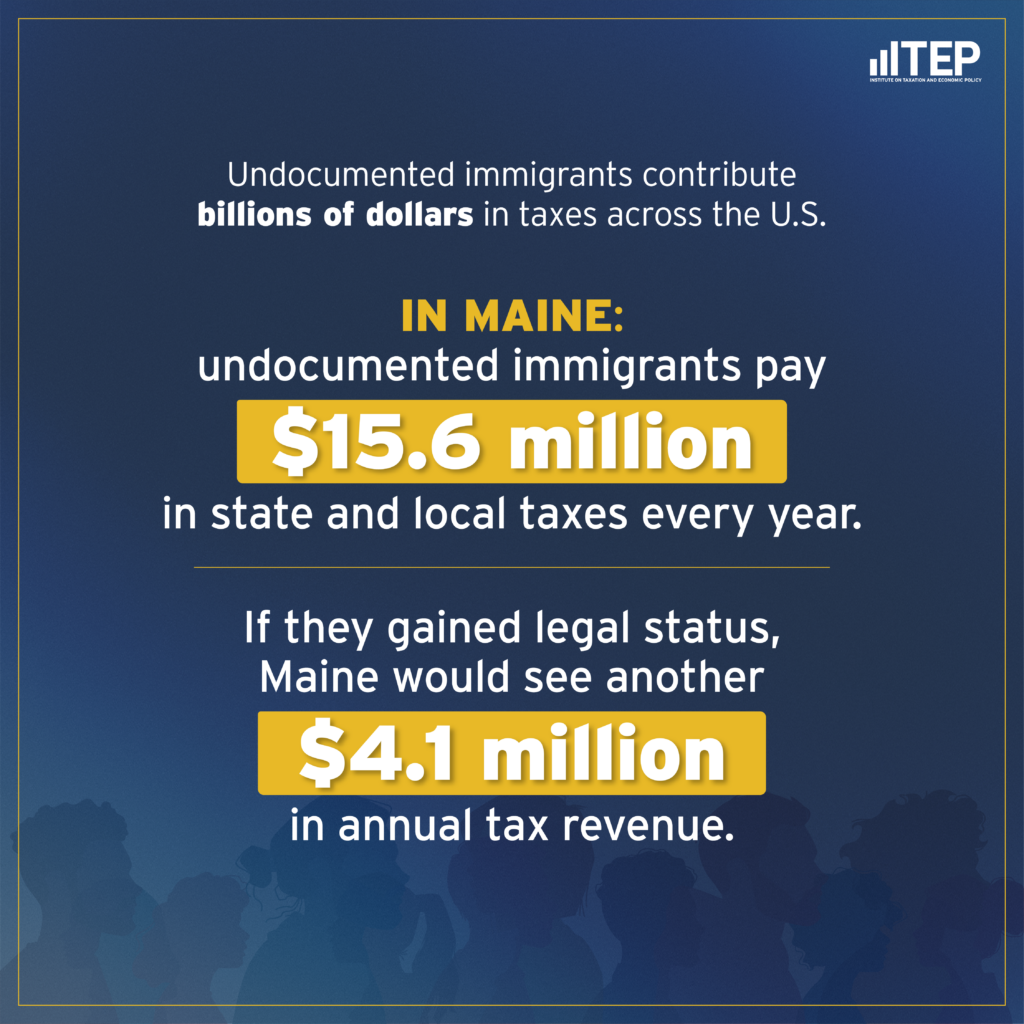A new report from the Institute for Taxation and Economic Policy (ITEP) confirms undocumented immigrants contribute to the strength of our economy and the health of public finances.
The report estimates just under 11 million undocumented immigrants in the United States paid $96.7 billion in federal, state, and local taxes in 2022. This includes $15.6 million in state and local taxes paid by 5,000 undocumented immigrants in Maine. The report also estimates state and local governments would see millions of dollars of additional tax revenue if these immigrants were given work authorization.
Undocumented Mainers pay $15.6 million in state and local taxes, $4.4 million of which is paid in state income taxes each year, another $4.9 million in sales and excise taxes, and $6 million in property taxes to municipal governments. ITEP estimates these individuals have a combined income of $176 million, giving them an effective state and local tax rate of 8.9% — very similar to the average tax rate of 9.3% paid by all Mainers at a similar income level (around $35,000 per year).
In addition to the contributions to state and local finances, the ITEP report highlights the role undocumented immigrants in the United States play in supporting the Social Security and Medicare programs. ITEP estimates undocumented immigrants paid $25.7 billion in Social Security taxes in 2022 and $6.4 billion in Medicare taxes. Undocumented immigrants are unable to claim these benefits when they retire, but nonetheless pay into them with payroll taxes.
ITEP further estimates the tax contributions of undocumented Mainers would significantly increase — by an additional $4.2 million in state and local taxes — if they had authorization to work in the US. This increase is due to several factors:
- While many undocumented workers currently work without legal permission to do so, authorization would allow even more to be employed.
- Tax compliance would increase among these individuals, which would result in more taxes being collected.
- Unscrupulous employers couldn’t take advantage of undocumented immigrants by paying them at lower rates than other workers. More money from employment also means more money for immigrants to spend, which in turn increases property and sales tax collections, and boosts our overall economy.
Allowing undocumented immigrants a pathway to legal status is broadly popular. In both national and state-level polls, Americans and Mainers generally support allowing undocumented immigrants a chance to apply for legal status. A similar sentiment was expressed on a bipartisan basis by the Maine legislature last year, when it asked the federal government to speed up work authorization for asylum seekers.
The ITEP report is a reminder for policymakers of what should already be widely known — immigrants, including undocumented immigrants, contribute to our economy and our public finances. In fact, the findings for undocumented immigrants are similar to Maine Center for Economic Policy’s own research on the contributions of immigrants in Maine.
MECEP urges policymakers at the federal level to recognize the need for comprehensive immigration reform to give a pathway to legal status for the 11 million undocumented workers who are already a part of our social and economic fabric. And in Maine, for lawmakers to recognize that undocumented immigrants already contribute to public finances and should be able to qualify for state programs. One of the best ways we can ensure employers have the workers they need and Maine has the revenue to fund our needs is to give all New Mainers the legal authority to live and work here as quickly as possible.
Methodological note: The population of undocumented immigrants in the ITEP report includes individuals who do not have a formal immigration status or permission to work. It therefore excludes refugees and people enrolled in the Deferred Action for Childhood Arrivals program (DACA). Due to the difficulty of determining whether likely asylum seekers have received permission to work or confirmation of status, they are excluded from the undocumented population in the ITEP report.





